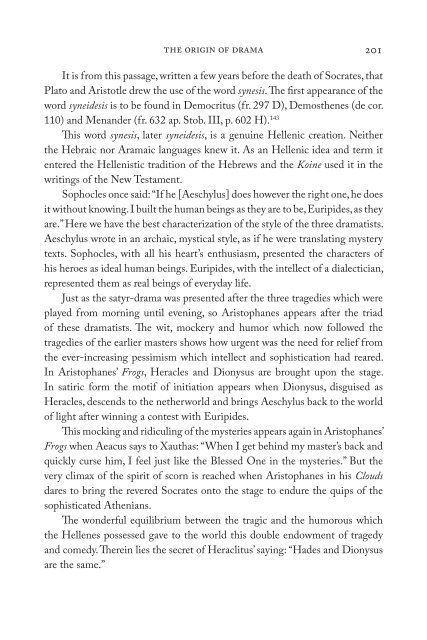The Gospel of Hellas - Research Institute for Waldorf Education
The Gospel of Hellas - Research Institute for Waldorf Education
The Gospel of Hellas - Research Institute for Waldorf Education
Create successful ePaper yourself
Turn your PDF publications into a flip-book with our unique Google optimized e-Paper software.
the origin <strong>of</strong> drama<br />
It is from this passage, written a few years be<strong>for</strong>e the death <strong>of</strong> Socrates, that<br />
Plato and Aristotle drew the use <strong>of</strong> the word synesis. <strong>The</strong> first appearance <strong>of</strong> the<br />
word syneidesis is to be found in Democritus (fr. 297 D), Demosthenes (de cor.<br />
110) and Menander (fr. 632 ap. Stob. III, p. 602 H). 143<br />
This word synesis, later syneidesis, is a genuine Hellenic creation. Neither<br />
the Hebraic nor Aramaic languages knew it. As an Hellenic idea and term it<br />
entered the Hellenistic tradition <strong>of</strong> the Hebrews and the Koine used it in the<br />
writings <strong>of</strong> the New Testament.<br />
Sophocles once said: “If he [Aeschylus] does however the right one, he does<br />
it without knowing. I built the human beings as they are to be, Euripides, as they<br />
are.” Here we have the best characterization <strong>of</strong> the style <strong>of</strong> the three dramatists.<br />
Aeschylus wrote in an archaic, mystical style, as if he were translating mystery<br />
texts. Sophocles, with all his heart’s enthusiasm, presented the characters <strong>of</strong><br />
his heroes as ideal human beings. Euripides, with the intellect <strong>of</strong> a dialectician,<br />
represented them as real beings <strong>of</strong> everyday life.<br />
Just as the satyr-drama was presented after the three tragedies which were<br />
played from morning until evening, so Aristophanes appears after the triad<br />
<strong>of</strong> these dramatists. <strong>The</strong> wit, mockery and humor which now followed the<br />
tragedies <strong>of</strong> the earlier masters shows how urgent was the need <strong>for</strong> relief from<br />
the ever-increasing pessimism which intellect and sophistication had reared.<br />
In Aristophanes’ Frogs, Heracles and Dionysus are brought upon the stage.<br />
In satiric <strong>for</strong>m the motif <strong>of</strong> initiation appears when Dionysus, disguised as<br />
Heracles, descends to the netherworld and brings Aeschylus back to the world<br />
<strong>of</strong> light after winning a contest with Euripides.<br />
This mocking and ridiculing <strong>of</strong> the mysteries appears again in Aristophanes’<br />
Frogs when Aeacus says to Xauthas: “When I get behind my master’s back and<br />
quickly curse him, I feel just like the Blessed One in the mysteries.” But the<br />
very climax <strong>of</strong> the spirit <strong>of</strong> scorn is reached when Aristophanes in his Clouds<br />
dares to bring the revered Socrates onto the stage to endure the quips <strong>of</strong> the<br />
sophisticated Athenians.<br />
<strong>The</strong> wonderful equilibrium between the tragic and the humorous which<br />
the Hellenes possessed gave to the world this double endowment <strong>of</strong> tragedy<br />
and comedy. <strong>The</strong>rein lies the secret <strong>of</strong> Heraclitus’ saying: “Hades and Dionysus<br />
are the same.”<br />
0

















